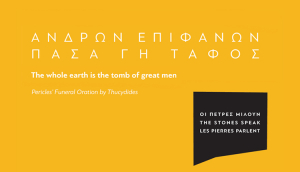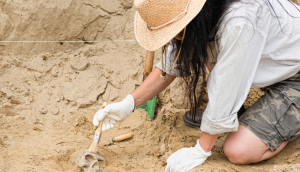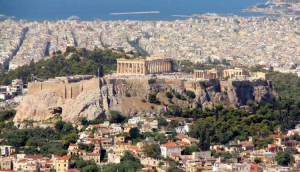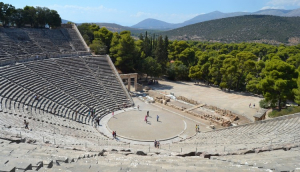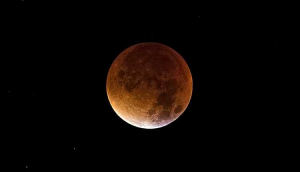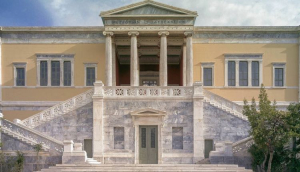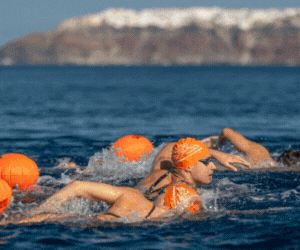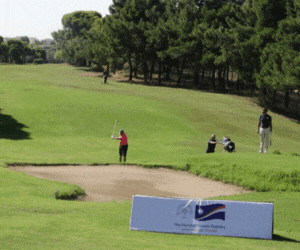XpatAthens
Ancient Theater Comes Alive In 3 Prominent Athenian Locations
Starting on Friday, July 5, visitors to Athens will have the chance to experience ancient Greek theater at the Acropolis Museum, the Byzantine and Christian Museum, and the Ancient Agora. Named 'The Stones Speak' (Oi Petres Miloun), the program features a series of theater performances that aim to showcase Greek cultural heritage and blend Greek culture into tourism.
From July to October, a group of young actors will present world-class texts by Homer, Plato, Aristotle, Thucydides, Sophocles, and Aristophanes, every Friday, Saturday, and Sunday from 11:00 to 13:00. The performances will be carried out in French, English, and Greek.
The first performance will take place on July 5 at the Byzantine and Christian Museum. In September the performances will be held at the Ancient Agora and at the Acropolis Museum in October.
Admission to all events is free of charge.
To read this article in full, please visit: Greek Travel Pages
Greek Fossil Is Considered The Earliest Evidence Of Homo Sapiens Outside Africa
Scientists claim that the chunk of skull recovered from a cave in southern Greece is the earliest sign of the human species outside Africa. The fragments are estimated to be at least 210,000 years old, which indicates that our species began leaving Africa much earlier than previously thought.
The skull fossil was excavated in the late 1970s at the Apidima Cave in southern Peloponnese.
To establish the age, scientists analyzed bits of bone from the fossil; to identify what species it came from, they compared a virtual reconstruction to the shapes of fossils from known species.
According to Katerina Harvati, it’s not clear if scientists will be able to collect DNA or proteins from the fossil to verify its identity.
To read this article in full, please visit: Greece-Is.com
Free Yoga In The Park
Yoga helps coordinate physical movement and mental processes through gentle practice involving breathing, asana postures, and relaxation. Through soft, controlled breathing, participants gain peace of mind, self-control, and concentration, and develop positive thinking.
Participants should bring a yoga mat and wear comfortable clothes.
Admission is free on a first-come, first-served basis.
Schedule: Friday 19 July 2019 at19:00, Monday 22 July 2019 at 19:00, Tuesday 23 July 2019 at 08:00, Thursday 25 July 2019 at 08:00, Friday 26 July 2019 at 19:00, Monday 29 July 2019 at 19:00, and Tuesday 30 July 2019 at 08:00.
Source: snfcc.org
Deadline For Submitting Tax Returns Extended To July 29
Until now, 2.2 million tax returns have already been submitted online. Out of a total of 2.93 million statements, more than 334,000 indicate a tax rebate, nearly 1.8 million indicate a zero balance, and 790,000 show a debt to the state.
Article source: Naftemporiki.gr
Simple Ways To Keep Athens Clean
Clean Your Neighborhood
If you are interested in removing unwanted graffiti and tags in your neighborhood, contact the City of Athens' synAthina by email at synathina@athens.gr or by phone at 210 3464738.
Don't dump your old refrigerator, washer, cooker, or any other electrical appliance on the street. The City of Athens collects old appliances for special recycling. All you need to do is book a time slot through 1595, the municipality's 24 hour phone line.
Tie Up Garbage Bags
Please tie up garbage bags before putting them into the dumpster; this way, the sidewalks, and streets won't get dirty during garbage collection. Note: When placing recyclables into the blue recycling dumpsters bags don't need to be tied up.
Organize your Recyclables
Please organize your recycling at home. Putting your recyclable materials in different bags makes the process at the collection and sorting recycling plants a whole lot easier.
Don't Move The Dustbins
Please don't move the dustbins; this makes the cleaning, and garbage collection process much easier and more effective.
Originally Posted on City Of Athens
Translated by XpatAthens
‘The Trip’ Comes To Greece
Even though details regarding the episode have not been revealed, the duo's travel to Greece will focus on their clashing personalities.
According to the Hellenic Film Commission (HFC), "The Trip to Greece" will showcase the comedians visiting many of Greece's historical sites and monuments, including the Temple of Apollo in Delphi, the Ancient Agora of Athens, the Ancient Theater of Epidaurus and more.
To read this article in full, please visit: eKathimerini
Musical Journey Under The August Full Moon At The Acropolis Museum
On this day, the Museum will be open from 8 a.m. to 12 midnight with free entry from 8pm onwards, and visitors will be able to enjoy the permanent exhibition galleries as well as the temporary exhibition ‘Chisel and Memory. The contribution of marble craftsmanship to the restoration of the Acropolis monuments’.
Source: The Acropolis Museum
Navarino Challenge: Shortlisted At The International Travel & Tourism Awards 2019
Another success is added to the events of Active Media Group. Specifically, the prestigious International Travel & Tourism Awards 2019 presented by the World Travel Market that evaluates and recognizes the best in global travel & tourism industry, included this year Active Media with the top sports event of “Navarino Challenge” in its shortlist for the Best in Wellness category. The final results will be announced on Tuesday, November 5, 2019, at the awards ceremony in London.
The executives of Active Media Group having an experience of more than 20 years in the field of sports events production bring yet another collaboration. Specifically, Active Media Group will undertake the Sports Presentation of the Mediterranean Beach Games to be held in Patras from 25-31 August, 2019. The games will include the presentation of eleven sports in total at ten sports facilities.
For this event our company is working with Mr. Yorgos Makrydakis an international expert in sports presentations.
Register for Navarino Challenge today!
XpatAthens is proud to be a Media Sponsor Of Navarino Challenge 2019
Bank of China To Open Branch In Greece
The NTUA Among The Top 10 Universities In The World
The university's School of Civil Engineering ranks 7th in the world and 3rd in Europe, making the NTUA the only Greek university school to rank in the first 10 schools in the world.
The School of Naval Architecture and Marine Engineering ranks 29th in the world and 12th in Europe. While the School of Electrical Engineering, the School of Mechanical Engineering, and the School of Chemical Engineering also hold satisfactory rankings.
Professor Ioannis Golias, the rector of NTUA, stated: "the university, despite problems with low funding and the reduction in teachers and staff continues to be ranked among the first worldwide due to the staff's efforts and the high level of its students. These are very satisfying results for the university, which continues its effort for the continuous improvement at all levels of academic and research activity".


